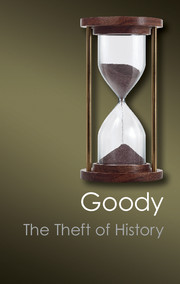Book contents
- Frontmatter
- Contents
- Acknowledgements
- Introduction
- Part One A socio-cultural genealogy
- Part Two Three scholarly perspectives
- Part Three Three institutions and values
- 8 The theft of institutions, towns, and universities
- 9 The appropriation of values: humanism, democracy, and individualism
- 10 Stolen love: European claims to the emotions
- 11 Last words
- References
- Index
10 - Stolen love: European claims to the emotions
Published online by Cambridge University Press: 05 July 2014
- Frontmatter
- Contents
- Acknowledgements
- Introduction
- Part One A socio-cultural genealogy
- Part Two Three scholarly perspectives
- Part Three Three institutions and values
- 8 The theft of institutions, towns, and universities
- 9 The appropriation of values: humanism, democracy, and individualism
- 10 Stolen love: European claims to the emotions
- 11 Last words
- References
- Index
Summary
Not only have certain much prized institutions and values been claimed by Europe as unique to itself, but the same has happened even with some emotions, particularly that of love. Some forms of love, sometimes the idea of love itself, have been seen as a purely western phenomenon. This idea is especially strong among many medieval historians, such as Duby, who have created a tradition which claims that ‘romantic love’ had its birth in the troubadour society of twelfth-century Europe. Modern historians of the family have used the notion of the uniqueness of love relationships to account for certain features of domestic life connected with the demographic transition from larger to smaller families and with the role of the conjugal family in the growth of capitalism. Some sociologists have seen it as a key to modernization, especially the modernization of the affectual life. Others more generally have considered it to be linked to their religion – an attribute of Christianity and of Christian charity (‘love thy neighbour’) where love is interpreted as fraternal love. It has been a general assumption of many European scholars, including psychologists like Person who saw the idea as spreading throughout western culture with the ‘increasing emphasis on individuality as a primary value’. Love, romantic love, is frequently believed to go hand in hand with individualism, with freedom (of choice of partner, as distinct from arranged marriage), and with modernization in general. I am not concerned primarily with why Europeans have made this ethnocentric claim.
- Type
- Chapter
- Information
- The Theft of History , pp. 267 - 285Publisher: Cambridge University PressPrint publication year: 2012

